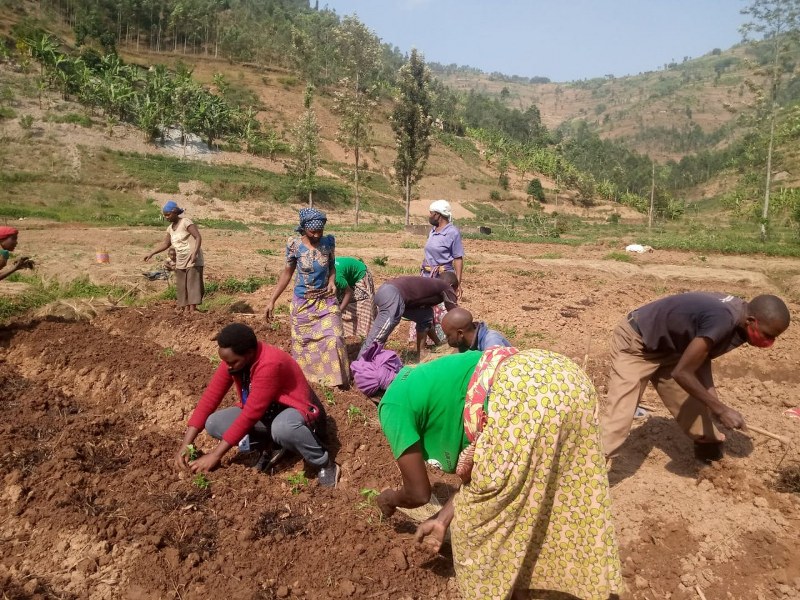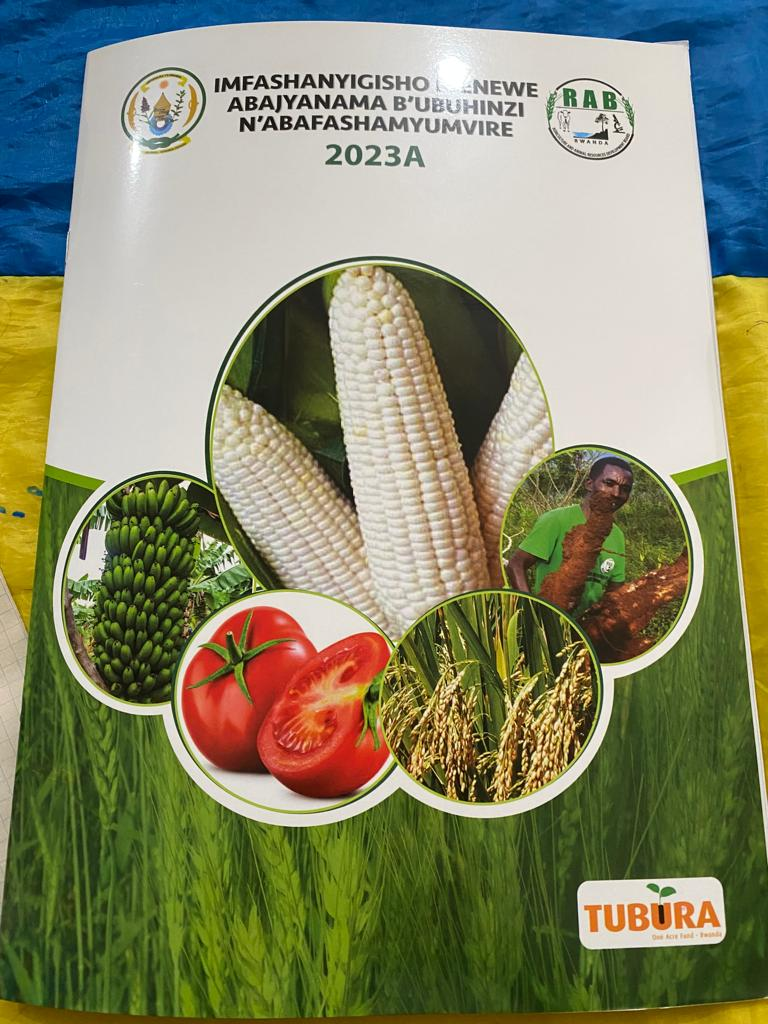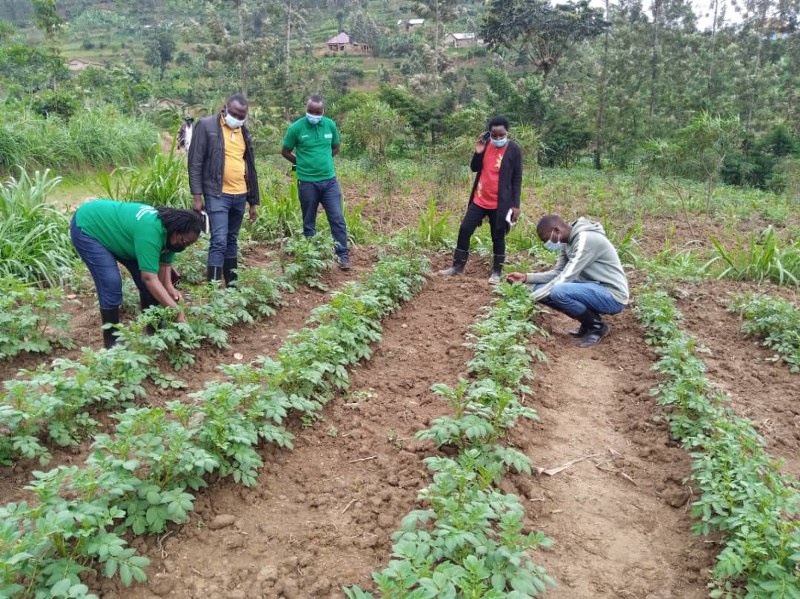Rwanda is a small country with 26 338 km² and arable land estimated to 48% of its total area (FAO, 2016). Its population is estimated to 12,952,209 people (UN, 2019) and the majority of its rural households derive their income mainly from agricultural activities. As other countries of Eastern Africa, Rwanda has experienced the use of Farmer Field School as an approach for Agricultural extension services. FFS approach was introduced in Rwanda in 2008 by Belgian Technical cooperation (BTC).Since 2014, Farmer Field Schools (FFS) have had a tremendous impact on the lives of farmers within Rwanda. The Ministry of Agriculture and Livestock integrated and institutionalized the approach through the National Extension program called the Twigire Muhinzi which literally means: « Farmers let us ensure our self-reliance».
This extension Model stands on two legs in the communities, the 1st leg is the Farmer Promoter (FP) operate and elected at village level by its peers and the second one the “Farmer Field School Facilitator (FFSF)” trained by a FFS Master Trainer on a specific crop(s) or livestock. For now, Rwanda counts almost 2500 FFSFs and 14.200 FPs. TWIGIRE MUHINZI program is strongly supported by the ministry of Agriculture and animal resources in charge of policy and guidance formation , the Rwanda Agriculture and animal resources Board (RAB) in providing technical support: regular training, regulation, coordination and monitoring of different activities , the Ministry of local Government (MINALOC) in charge of the Twigire Muhinzi Program implementation and day to day planning and coordination from the district to village levels through district and sector agronomist officers and socio-economic and development officers (SEDO)
Under the supervision and the guidance of the aforementioned district officers, each FFS facilitator operates at cell level and season after season, organize one or two FFS groups of 15 to 25 farmers each, through a season long training around experimental plots. Each Farmer Promoter mobilize farmers in Twigire Groups (the number of group farmers depending on the total number of farmers registered in each village) around demonstration plots in which he/she provides basic agricultures trainings and drive up inputs use.
TWIGIRE MUHINZI has come to solve many problems related to poor access to agricultural information especially for smallholder farmers! With its local stakeholders among others plants doctors, agro-dealers, private Extensionists, seed producers.
TWIGIRE MMUHINZI PROGRAM, has shown its effectiveness in the acquisition and rapid adoption of agricultural technologies that have led to the growth of crop production and acquisition of other skills that have led some farmers to self-reliance. The benefits of this approach are multiple and have been observed by farmers themselves as well as by different stakeholders engaged in Rwanda agricultural sector. In most cases the yield growth for farmers who are participating actively in FFS approach is almost 10% higher than for the non-participants (MINAGRI, 2016). With the FFS approach farming extension cost has been tangibly reduced. Farmers who are really engaged in FFS group and Twigire Muhinzi groups tend to become professional farmers.
TWIGRE MUHINZI in action at sector level
How is Twigire Muhinzi programme engaged at sector level? and how are stakeholders being connected for the benefit of farmers? The Eastern African Field school support hub through the Ms. Karekezi Odile, the Master Trainer expert paid a field visit to Bushoki sector in Rulindo district organized by the Agronomist officer of Bushoki sector and was able to observe the linkage.
Collaboration of different stakeholders in preparing every agriculture season
At the beginning of each agricultural season, all stakeholders of Twigire Muhinzi Programme at sector level come together to evaluate the previous growing season, plan all required activities, disseminate important messages through field training sessions, ensure that farmers have registered in the Smart Nkunganire system, distribute training manuals, distribute agricultural inputs Farmer Promoters etc.

Mr. Tuyishime Jean Dieu to prepare for the A2023 agriculture season. This sector counts 5 Socio-

economic development officers and 14 FFS facilitators operating in 5 cells, 37 Farmers promoters corresponding to 37 villages, and 13 agro-dealers who sells agricultures inputs. All of them were invited to attend the meeting. To date, all attendees have received a training session organized by RAB on Maize planting and management. The Maize is the focus crop in Bushoki sector for season A. They also received a training Manual on different focal crops in all country. This manual is conceived and reviewed annually by RAB.
The commitment of Local government officials in charge of agriculture.
The Twigire Muhinzi program is strongly supported by Sector agronomists and the socio-economic development officers and staff of MINALOC. Mr. Tuyishime Jean de Dieu, sector Agronomist of Bushoki Sector Said: “I am responsible all activities of TWIGIRE MUHINZI at sector level: Capacity building of FFS Facilitator and Farmer Promoters and their mentoring on regular basis. I’m responsible of their evaluation! I manage all data regarding agriculture production and extension”.
He stressed the irreproachable and important role of his collaborators “Alone I cannot reach the 7000 farmers registered in Bushoki sector but with 5 SEDO, 14 FFS facilitators and the 37 Farmer promoters my work has become very easy, I can reach them in 3 days. “I organize regular meetings with them and give them some guidance and feel reassured that the message will reach all farmers in few days and easily.” he noted.

Mrs. Dusabe Josephine, the SEDO of Bushoki sector Proudly showcased his role in the implementation of Twigire Muhinzi “As a SEDO, I’m normally in charge of data collection and information regarding Twigire Muhinzi implementation such as the number of farmers registered in smart Nkunganire system by Farmer Promoters, the number of Twigire Muhinzi Plots (Demo Plots) and FFS initiated by each village in Mukoto cell.”
Additionally, he said that since he had been trained by FAO Rwanda and graduated as FFS facilitator, he backstops regularly the FFS facilitators operating in his cell on production of tomato and Irish potato.

The engagement of skilled FFS Facilitators and Farmer promoters
The benefits of the Twigire Muhinzi progamme has been tremendously is achieved with support from the local government staff who are skilled and committed FFS facilitators and Farmer Promoters :
FFS Facilitators: The Bushoki Sector counts 14 FFS facilitators strongly skilled and experienced at good practices of various crops: 7 on Banana production, 1 on Irish Potato, 2 on vegetables, 1 on Maize, 1 on Jack fruit, 1 on wheat and 1 on livestock. They try as much as possible to take care of the good functioning of Twigire muhinzi program through FFS groups and do weekly learning session with farmers and Farmer Promoters under the guidance of the sector agronomist. They regularly do the follow up of farmers to ensure that the FFS lessons are given applied in right way and. Due to various trainings they are receiving from RAB and partners, they have enough skills to perform their duties as trainers.
Mrs. Yvonne, FFS Facilitator and an agro-dealer, for 10 years is running weekly program to follow up FFS groups in her area. With such knowledge and activities, she has become a very busy women and serving a lot the interest of farmers while ensuring wellbeing of her family. «Every year I follow almost 400 farmers in all 37 villages in Bushoki sector. In collaboration with the Agronomist of the Sector and SEDO» she noted.
Farmer promoters: The Bushoki sector counts 37 Farmer Promoters corresponding to its 37 villages. They are chosen by their peers and they commit to serve and work hard to connect their group members to the Rwanda agricultural structure and extension system. They manage to monitor daily activities in Twigire Muhinzi groups of 15 to 25 farmers around demo plots in their respective villages.
Mrs. Twizeyimana Marie Chantal, Farmer Promoter, said: “My regular responsibility is to train season by season 219 farmers, trough 8 Twigire Muhinzi in Gasiza village groups. I focus on key crop of the Crop Intensification Program (CIP): beans, maize, Irish Potato and different vegetables. I’m well guided by a RAB manual and in most cases by the FFS facilitators and Sector staff. Even if my services are not paid, I am enough skilled that some big farmers in my communities ask me for paid services. Thanks to this I manage to contribute to pay for the schooling of my children”
The Digital platform and management Twigire Muhinzi performance
The Government of Rwanda for years has been providing a grant annually at the beginning of each season with the aim of reducing the farming input price and encourages farmers to use appropriate seeds, fertilizers and crop pesticides. To make this support effective to farmers, the Rwanda Agricultural Board (RAB) initiated a digital platform entitled SMART nkunganire where the farmers are requested to register themselves through phones and a digital application that provides them the right to buy input from authorized agro dealers stores operating near them with the cheapest price. This subvention system has been made possible due to good cooperation between the Farmer Promoters the SEDO and the sector agronomists. The Farmer promoters do community sensitization and farmer registration while SEDO and Sector agronomist are controlling the system and ensure close monitoring and effective use of the inputs.
Key outcomes : The yield is almost doubled
Farmers have proven that when they follow the training in the field, they immediately go to apply it in their fields an d believe that the yield gotten is twice compared to the previous production.
Knowledge spread quickly and efficiently
It observed that farmers who managed to apply successfully the FFS and Twigire Muhinzi groups trainings are inspiring their neighbors who are not participating in these groups. Even without mobilizing them, they came to observe themselves how their neighbors are managing to increase production as such way. A Twigire Muhinzi member from Mokoto village indicated that the first semester he transferred his knowledge to 3 neighbors who were not participating in Twigire Muhinzi groups.
The nature of learning sessions.
The Twigire Muhizi and FFS sessions are being seen as a powerful tool in changing the farmers’ mind set and behaviors. During the visit of EAFS Support hub in Rulondo District, it was noted that the learners are pleased to gather and learn from each other. During the training sessions, Participants are able to acquire enough knowledge by the demonstration as well as able to repeat the experiences with assistance of the farmer promoters. «The more we practice, the more we end by becoming experts. It only requires the availability of seeds and other inputs» said Mrs Musengimana Constance from Mukoto cell, Buvumo Village.
Conclusion
Countries from the Eastern Africa through the Field School Hub currently hosted by AFAAS can learn from the success of Twigire Muhinzi program in Rwanda, it is well decentralized from the Ministry to village level. The sector staff in charge of agriculture extension are committed to lead the program and make tangibles results. There is also need for continuous refresher courses on the FFS approach because it has been observed that those who are equipped on the approach become the real mentors of FFS facilitators and Farmer Promoters thus understanding and implementating of Twigire Muhinzi program has been quite possible and successful
AUTHOR; Mrs. Karekezi Odile, Master Trainer Expert Eastern Africa Field Schools Support Hub-Rwanda
